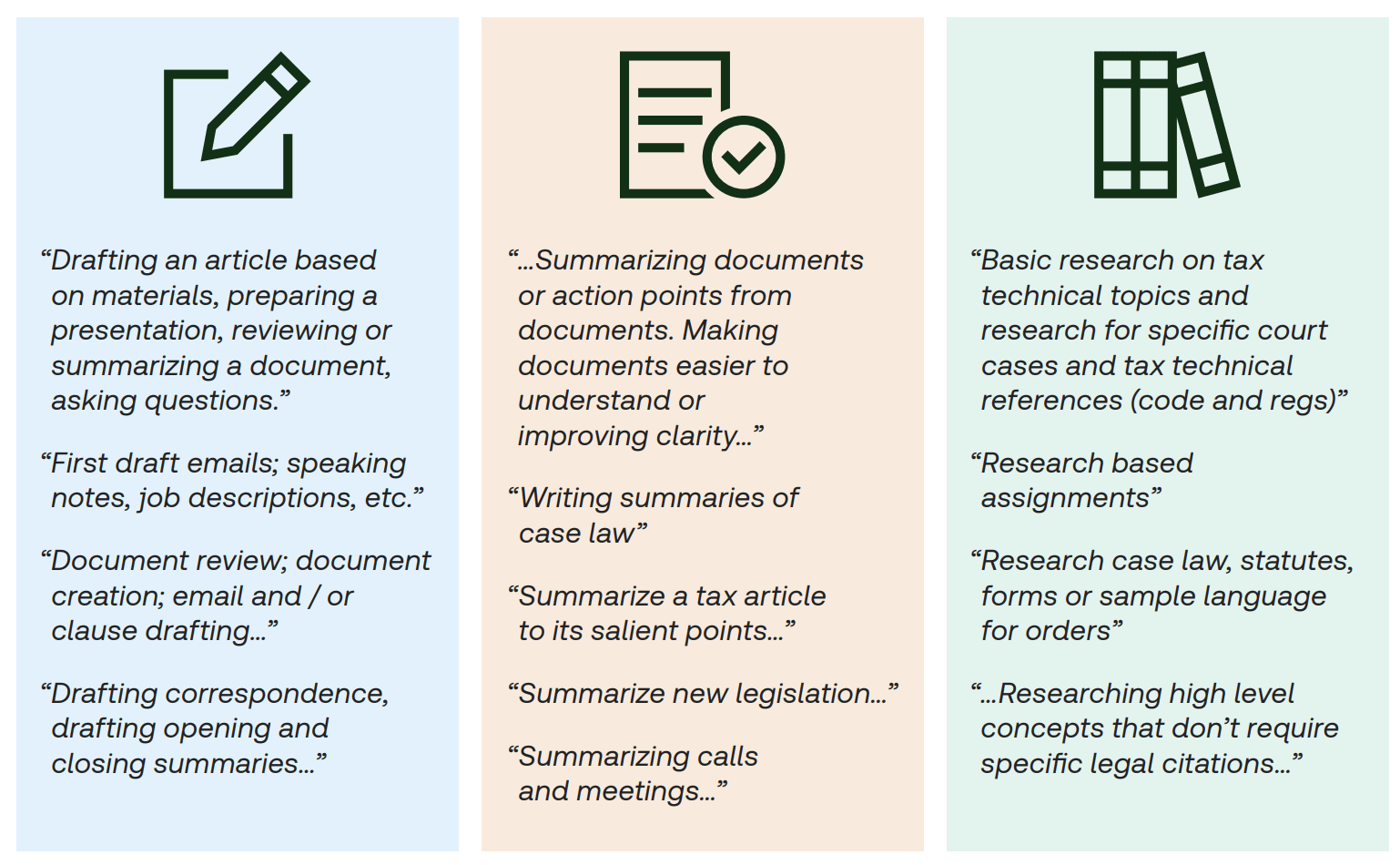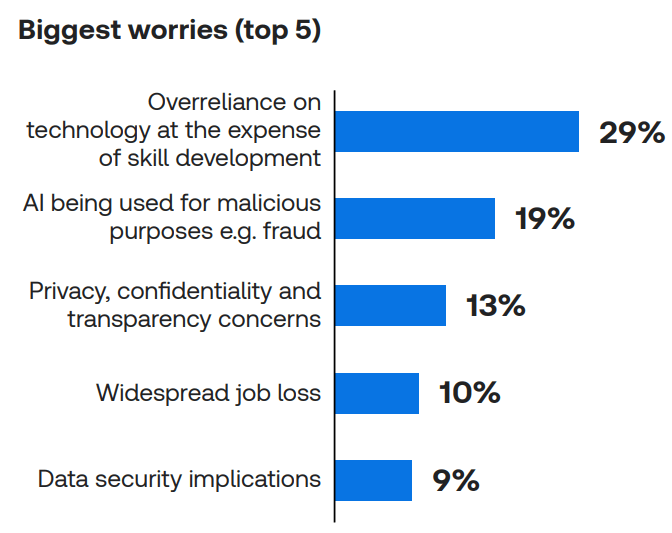Explore practical ways that lawyers can confidently prepare for the future of AI while achieving their career and job goals
Jump to ↓
| Use cases: AI for legal work |
| Enhancing value to clients with AI |
| Reducing AI concerns |
| Adopting AI for the future |
Statistics from the Future of Professional Report
|
Despite lingering concerns, legal professionals are increasingly embracing artificial intelligence (AI), as a transformative force. AI’s impact on the legal industry includes how tasks are performed, how clients are served, and what skills law firms and legal departments will need to add. This AI guide for legal professionals will provide practical ways that lawyers can confidently prepare for the future of AI while achieving their career and job goals.
Use cases: AI for legal work
One of the strongest arguments for introducing AI for legal work is its ability to boost productivity through time savings and task automation. AI-powered tools can take on time-consuming, often tedious, but still essential work so that legal practitioners can focus their valuable time on services that deliver higher value to clients or (in the case of in-house legal departments) businesses they serve.
The extra time that AI provides also can allow law firms to work on business-building activities such as marketing and strategic planning. By improving how legal professionals draft, summarize, and research, here’s how AI can positively impact efficiency and productivity.

Document drafting
Crafting effective contracts and other documents demands a thorough understanding of legal terms and their implications to safeguard all parties’ interests and meet legal standards. Thanks to its use of large language models (LLMs), AI can analyze large volumes of precedents and current case law to provide clauses and language that have been judicially tested, thereby reducing the risk of future disputes.
Summarizing information
An AI tool can pore through vast amounts of legal data and other information in seconds rather than hours. It also can automate repetitive tasks such as document review and collating presentations.
Research
By being able to pore through thousands of documents and data sources in a short period of time, AI tools can engage in more accurate and efficient research than human beings can conduct. For litigators, AI can provide numerous research benefits. For instance, gathering information on witnesses and identifying applicable claims and counterclaims.
Other use cases
While these three use cases are the most notable impacts of AI in legal work, they don’t exhaust the ways that lawyers can put this technology to work. AI tools can aid law firms and legal departments with spending and matter management, providing analytics and benchmarking. AI technology also can help lawyers quickly find resources that they might not have known existed, thus mitigating the risk of missing crucial information that could derail a case.
These are the capabilities that lawyers should look at as they conduct due diligence on AI solutions. One type of tool that lawyers should consider is an AI assistant, a GenAI-powered tool that can gather and analyze legal data at high speed, providing research results as well as document search and analysis. It can also generate timelines and ensure that contracts are in compliance with specific policies and regulations.
|
Key takeaway

CoCounsel
Bringing together generative AI, trusted content and expert insights
Meet your AI assistant ↗
Enhancing value to clients with AI
AI has been impacting how legal services deliver value to their clients, and it will continue to do so. Adding value with AI to workflows translates into adding value to clients for law firms and corporate legal departments.
Value of expert-driven work
In the Future of Professionals Report, when asked which of the following changes professionals would most like to see in their profession, 42% stated they would want to spend more time on engaging, judgment-based, or expertise-driven work.

Respondents identified several key value areas where AI can allow them to provide more value to the clients and, by extension, to their firm:
- Handling large volumes of legal data more effectively (which 59% of respondents cited as an area where AI can help deliver greater and value)
- Improving client response times (41%)
- Reducing human error (35%)
- Providing advanced analytics for decision-making (33%)
In other words, professionals in legal teams are looking to AI as a means of providing more services to their clients in ways that can boost those clients’ success. Clients are often under pressure to lower expenses and to get responses to their legal needs and queries as quicky as possible. AI could allow lawyers to help their clients gain competitive advantages—and that can provide a competitive advantage for their practices.
Improving billing models
The incorporation of AI into legal workflows is likely to require changes to the legal industry’s traditional business models. Among the legal professionals surveyed in the Future of Professionals Report, 44% predict a decline in hourly rate billing models over the next five years as routine work becomes more efficient. The Thomson Reuters Institute’s Generative AI in Professional Services report offers a similar perspective. While more than half of the law firm respondents in this report believe that billing rates will stay the same or even increase, 39% believe that the use of alternative fee arrangements is likely to grow as the use of AI becomes more prevalent. A slightly smaller group believes the use of the hourly billing model will remain the same or even increase.
It’s likely, then, that there will be a push toward fixed fees for certain types of work (such as research and document review) that are automated and commoditized due to AI. At the same time, the incorporation of AI will allow firms to develop and offer advisory and consulting services that can provide value to their clients and add profitability to their practices. Offering such services will likely require shifting from the billable-hour model to project-based pricing.
A Thomson Reuters Institute report on the future of legal client relationships asserts that legal professionals must proactively adapt their client management strategies to ensure relevance and success as they navigate through technological changes (such as AI) and changing client expectations. This suggests that AI will require lawyers and clients to collaboratively develop innovative service and pricing models.
|
Key takeaway
Reducing AI concerns
Despite these benefits, legal professionals still have concerns about AI’s potential impact on legal work, specifically on the overreliance on technology and the possibility of fraud. According to the Future of Professionals Report, professionals believe the accuracy and transparency of the information and analysis that AI tools deliver, the security of firm and client data, and the ethical use of AI within the practice are vital in defining the responsible use of AI.

Accuracy of results
One of the top ways to ensure accuracy is by using AI tools that have been developed specifically for the legal profession. Such tools are designed to access data from legitimate legal sources, which the AI can cite so that the user can ascertain the results. As for data security, lawyers would certainly be doing their clients a profound disservice if they couldn’t protect those clients’ sensitive information. When it comes to client trust, cybersecurity requires firms and legal departments to take an active role in managing AI usage and establishing safeguards such as encryption, authentication, and employee training.
Ethical use of AI
When it comes to ethics, lawyers have begun staking out boundaries of how to use AI. Of the legal practitioners surveyed in the Future of Professionals Report, 96% agreed that allowing AI to represent clients in court would be “a step too far”—and 83% considered using AI to provide legal advice directly to clients also would be, ethically speaking, “a step too far.” With development and acceptance still evolving, the report’s respondents overwhelmingly believe that AI requires human oversight as well as clearly drawn boundaries regarding its use. Lawyers should stay on top of ongoing changes in regulatory and litigation changes regarding AI.
|
Key takeaway
Adopting AI for the future
One concern many lawyers have is being replaced by AI. But it’s more likely that AI will transform rather than eliminate jobs. In the Future of Professionals Report, 85% of respondents believe that the incorporation of AI into their practices will require adding new roles and skills, including specialists in implementation, training, and cybersecurity. All of which helps legal professionals focus on three key areas for the future of AI.

Lawyers convinced of the benefits of AI should establish clear steps for integrating this technology to be ready for an AI-powered future:
- Identify what the firm or department needs from an AI platform. This list should be as comprehensive as possible. For instance, it should include repetitive tasks that AI could automate.
- Perform due diligence on potential tools. We noted earlier the types of capabilities that lawyers should look for as their firm or department “shops” for an AI platform.
- Prepare colleagues to successfully use AI. This should include training, awareness of employee pain points, and continuous feedback to ensure adoption goes as smoothly as possible.
One AI tool for legal professionals that can make it easier to integrate this ever-evolving technology into their practices is Thomson Reuters CoCounsel. This GenAI-powered assistant, harnessing the knowledge of 1,500 legal experts, can perform many legal-specific tasks, enhance team workflows, and prepare attorneys for the new era of work. In November, Thomson Reuters began testing a version of CoCounsel built upon OpenAI’s new 01-mini LLM, which promises to significantly boost the tool’s legal reasoning capabilities.
In other words, AI tools will continue to learn and improve. That means legal professionals will also need to keep learning about AI and its impact on their practices. Two ways to get up to speed:
- Download the Future of Professionals Report
- Learn more about Thomson Reuters’ CoCounsel
|
Key takeaway
 |













